The United Arab Emirates reaches for the Red Planet
- Published
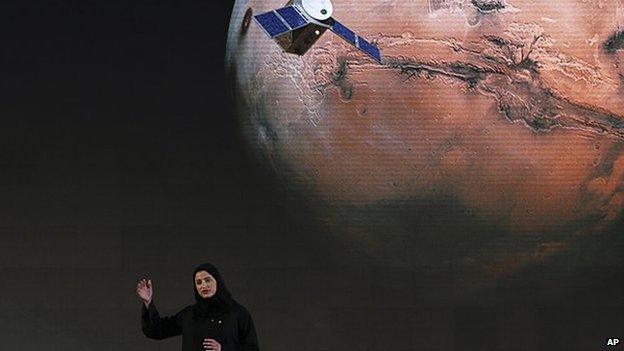
The UAE hopes its satellite could be in orbit around Mars by 2021
The oil industry is no longer enough for the United Arab Emirates (UAE), the Gulf state says it is diversifying its economy, by reaching for the stars - and Mars.
Its government has declared that a fully-fledged space sector is now "a primary national objective". It sits neatly alongside its past aims.
High ambitions have led to one of the world's fastest growing aviation sectors and high culture is on the radar too, albeit taking slightly longer than expected.
Branches of Paris's Louvre and New York's Guggenheim museums are scheduled to open soon in Abu Dhabi.
Now, with this focus on high-tech, the UAE is planning to build an unmanned space probe called Hope in the next six years, designed to orbit Mars for up to four years.
It is also setting up the Middle East's first space research centre, costing $27m over five years, and the region's first space degree for masters students.
Vanishing oil
One motivation behind these high-value, job-creation programmes is to diversify the economy. The UAE currently relies on oil for 40% of its earnings.
The low and volatile price of oil is not the only problem. There is a much darker cloud on the horizon. A fear of oil vanishing altogether.
When I saw the UAE's leader-in-waiting speak last February, I was stunned by his frankness.
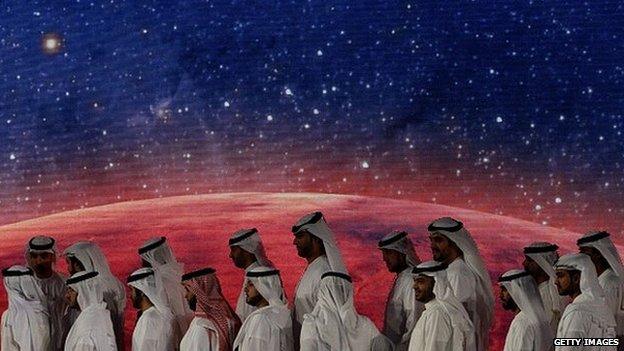
Developing a space sector could be key to diversifying the UAE's economy, say some
Addressing a crowd of dignitaries, delegates and journalists in a five-star, air-conditioned Dubai resort, as we sat sipping lemon mint cocktails, Crown Prince Sheikh Mohammed bin Zayed predicted his desert kingdom's oil and gas supplies would dry up within 50 years.
The crowd fell silent as the message sank in: all gone by 2065.
He said developing education, innovation and security, as well as a diversified economy, would secure his country's post-oil future.
So it is perhaps no surprise that the UAE has big plans for its new space agency- and wants to reach for the Red Planet.
Dr Mohamed Nasser Al Ahbabi, director general of the UAE Space Agency, says he wants the country to move from buying-in satellite systems to one that part-buys and part-builds its own systems.
In the past, UAE-engineered satellites have been built in South Korea and launched from Russia and Kazakhstan.
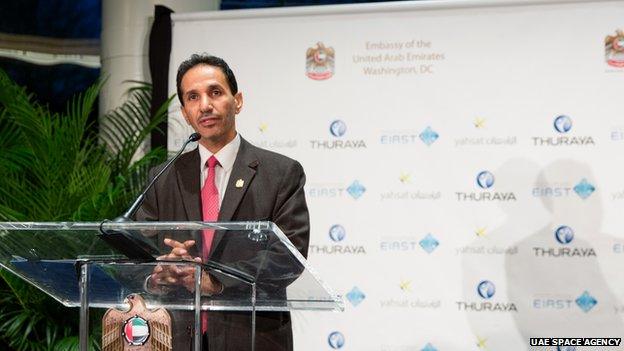
Developing the UAE's space sector will take time, concedes Dr Mohammad Nasser Al Ahbabi
The agency also wants to create pioneers in technology and space science, promote research and enhance international cooperation in the field.
Yet spending has so far been comparatively small:
In the past decade, only $5.4bn has been spent by the UAE on its space industry
Russia has allocated $37bn for its space agency over the next ten years
India spends over $1bn every year on its space programme
Total financial gains from the space sector so far are less than 5% of the annual income received from oil exports - a drop in the ocean.
Mars mission
The space sector generates money from satellite manufacturing and usage, and if any technological discoveries from missions can be adapted for everyday use in areas like healthcare, communications and solar power.
"The Mars mission is going to stimulate the development of manpower and technology required not only for the UAE's emerging space sector but all of the technological sectors which the UAE is relying on to diversify its economy," said Dr Steven Griffiths, vice-president for research at Masdar Institute.
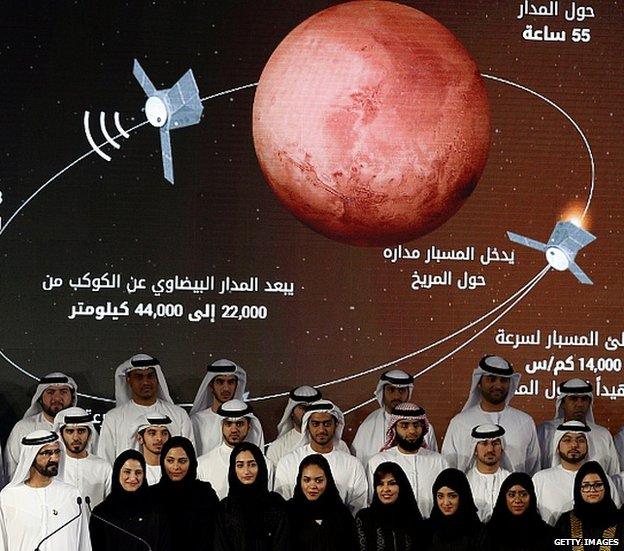
UAE Prime Minister Sheikh Mohammed bin Rashid al-Maktoum, with engineers and scientists unveiling the country's Mars mission
But nurturing local talent will be a real challenge for the government, as most of the necessary expertise to develop and run the space programme lies in the hands of foreigners.
Space Agency director-general Dr Al Ahbabi concedes that developing the sector will take time.
"We have a limited number of people. Every sector wants to grab some. We have to attract and inspire young people to study science and technology," he told me at the launch of the agency's strategic plan in Abu Dhabi.

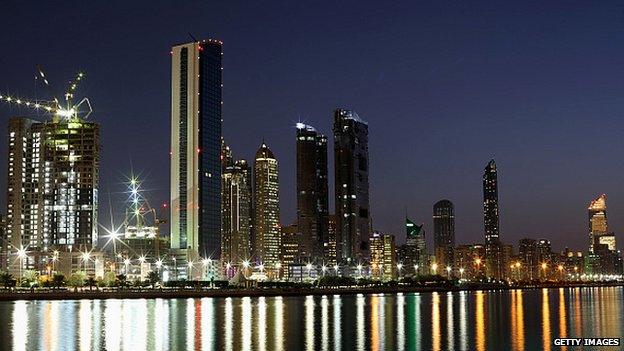
UAE's current space projects
Three major space operators in the UAE operate satellites worldwide for commercial and military use and offer satellite TV, data and mobile telecoms services
75 Emirati engineers are working on the Mars probe, Hope
Private investors backed by the Abu Dhabi government have a 38% stake, worth over $280m, in Richard Branson's Virgin Galactic space tourism programme

Announcing the region's first space degree for masters students in Abu Dhabi, which his company is sponsoring, Yahsat CEO Masood Mahmood said the space programme is at the 'hope' stage and believes it can replicate the 'tremendous' acceleration of other sectors in the UAE's economy.
"We are in the first decade. Give us some time... You need to provide the financial support. Once you see the fruit of that, the ecosystem will feed itself."
But before that can happen, several hurdles need to be overcome.
Attempts to send satellites to Mars in the past have failed and costs can vary greatly.
Last year India managed to send its Mangalyaan satellite into space at a tenth of the cost of the American Maven Mars orbiter.
Risks and rewards
One sceptical industry analyst, who asked not to be named, said UAE's Mars probe could end up as a "vanity project". He fears a repeat of much-heralded billion-dollar industrial projects near Abu Dhabi that stalled after promised funding never materialised.
UAE Vice-President Sheikh Mohammed was asked about the financing of the Mars probe at its press launch.
He was reported to have said: "One man asked me how much it cost. I told him it is not a cost, it is an investment. Our goal here is to have a study, a laboratory and specialisations regarding gravity, galaxies and Mars. This is just the start."
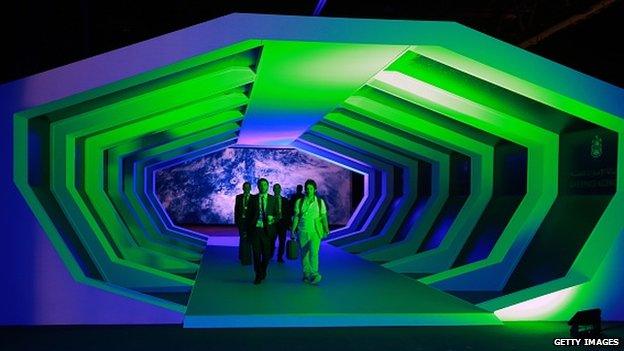
Some sceptics question whether UAE's space initiative will bear fruit in the decades to come
The project could also add value to the country's reputation.
Just ask the eccentric 61-year old German space memorabilia expert Tasillo Romisch.
I spoke to him as he showed off a $50,000 spacesuit from the 1980s, one of the 97,000 objects in his collection, which was on display in a temporary space museum in Abu Dhabi.
"There's not only a lot of money here," he said.
"They seem to me to be very committed to space flight activities. If they have young scientists who are educated, they could be global players," he continued.
"When?" I asked him. "In less than ten years," he replied.
On the other side of the hall, there was a stand advertising a local TV version of Sesame Street. The puppeteers said they would teach kids about space exploration during the second series, from next autumn.
Whether those young viewers will ever see their country lead the way in the real thing remains very much up in the air.